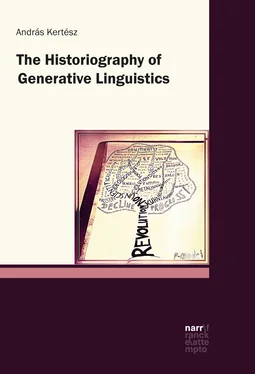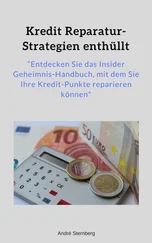We summarize BoeckxBoeckx, Cedric’s solution to (P) in (SP20):
| (SP20) |
The basic term of the historiographyhistoriography of generative linguistics is ›scientificscientific research program‹researchprogram with respect to the Minimalist Program,Minimalist Program its central hypothesis is (T20) and its framework is LakatosLakatos, Imre (1970b). |
2.5.2 No revolution
2.5.2.1 Spurious science
According to others, however (SearleSearle, John R. 2002a; PostalPostal, Paul M. 2003; PullumPullum, Geoffrey K. 1996; SeurenSeuren, Pieter A.M. 2004 etc.), minimalismminimalism is neither revolutionaryrevolutionary nor a progressive research programresearchprogram. This perspective will be represented by the example of Seuren (2004). The thesis is the following:
| (T21) |
The Minimalist ProgramMinimalist Program is spurious science.sciencespurious |
According to SeurenSeuren, Pieter A.M. (2004: 3), the Minimalist ProgramMinimalist Program represents not the glorification but rather the destruction of the development that ChomskyChomsky, Noam started with his early work. What is more,1
[…] ChomskyChomsky, Noam’s book The Minimalist ProgramMinimalist Program is a sad example of spurious sciencesciencespurious , as it fails to satisfy basic scientificscientific criteria , such as respect for datadata, unambiguous formulations, falsifiability, and also, on a different level, simple good manners (SeurenSeuren, Pieter A.M., 2004: 4; emphasis added).
SeurenSeuren, Pieter A.M. (2004: 8–10) bases his judgment on methodological criteria taken from the philosophy of sciencephilosophy of science. Referring to PopperPopper, Karl R. (1959), he maintains that according to the analytic philosophy of science there are generally accepted criteria of scientificscientific rationality which are rooted in common sense knowledge and are timeless. However, he also notes that this picture of science has been questioned by recent post-KuhnianKuhnian approaches which tend to relativism and which highlight the role of socialsocial factors in scientific inquiry. The latter maintain that the content of scientific knowledge is determined by social factors that change over time and that are shaped by the structure of social groups and social interests. Seuren chooses the middle course between these extremes. He does not deny that social factors can influence scientific inquiry, but at the same time, in accordance with the principles of the analytical philosophy of science, he also assumes that scientific values have universal features. He holds that
[…] work that presents itself as in any way scientificscientific or academic should satisfy certain judiciously applied elementary criteria of common rationality: clarity of expression; faithfulness to the relevant facts that are, or can be made, available, acceptance of whatever can be concluded on the basis of these facts; and a mandatory preference for the ›best theorytheory‹ – that is, for the theory that explains more facts with less machinery than rival theories on the market (SeurenSeuren, Pieter A.M. 2004: 10).
In SeurenSeuren, Pieter A.M.’s view, the Minimalist ProgramMinimalist Program fails to meet these criteria, and the final verdict is:2
[…] In the end, one is left with a story that is partly an incoherent fantasy […] and partly a repetition of old principles and methods (ibid 14).
The MP does not emerge as a serious theorytheory of grammargrammar or languagelanguage. Based as it is on flimsy general premises, an unsound methodologymethodology, unclear formulations and ideas, and a fatal scarcity of datadata. Every single element in the MP, to the extent that it was not taken over from elsewhere, has turned out to be badly researched, vaguely presented, or unsufficiently tested (ibid. 228).
The solution offered for (P) is:3
| (SP21) |
The basic term of the historiographyhistoriography of generative linguistics is ›spurious science‹sciencespurious with respect to the Minimalist Program,Minimalist Program its central hypothesis is (T21) and its framework is the generally accepted criteria of scientificscientific rationality in the analytic philosophy of science.philosophy of science |
2.5.2.2 Unscientific revolution
We mentioned in Section 2.4.1 that the work of LappinLappin, Shalom, LevineLevine, Robert D. and JohnsonJohnson, David D. – whose ironical title, The Structure of Unscientific Revolutions , intended to paraphrase the title of KuhnKuhn, Thomas S.’s book – created a heated debate by arguing for the following thesis:
| (T22) |
(a) |
Although the development of generative linguistics including the Theory of Government and BindingGovernment and Binding, Theory of can rightly be called revolutionary,revolutionary minimalismminimalism is a step backwards. |
|
(b) |
The retention of the Minimalist ProgramMinimalist Program is motivated exclusively by the authoritative organization of the generative community, and not by its scientificscientific significance. |
When arguing for (T22)(a), LappinLappin, Shalom et al. (2000a,b, 2001), emphasize in different ways that they are in agreement with the claim according to which generative linguistics has been revolutionaryrevolutionary since the end of the 1950s, culminating in Government-BindingGovernment and Binding, Theory of Theory. However, they cannot provide a rational explanation for the circumstance that the progression of this revolutionary change came to halt as a result of the uncritical acceptance of minimalismminimalism. The authors analyze the main categories of minimalism, which we listed in the first point in Section 2.5.0 – above all, the term ›perfectionperfection‹ –, and they draw the conclusion that minimalism is built upon the vague metaphor of ›perfectness‹ instead of a firm empirical basis (Lappin et al. 2000a: 666). Contrary to the second point in 2.5.0, they demonstrate that it is precisely those categories which were excluded from the technical apparatus of minimalism that made the Theory of Principles and ParametersPrinciples and Parameters, Theory of so well-known and successful worldwide (Lappin et al. 2000a: 668–9).
In connection with the third point in Section 2.5.0, they consider UriagerekaUriagereka, Juan (1998) to be the propagandistic defense of minimalismminimalism and take it as an example to demonstrate that minimalism »does not manage to specify even a remotely credible connection between the concepts and methodologymethodology of the MP [the Minimalist ProgramMinimalist Program] and those of the natural sciencesciencenaturals« (LappinLappin, Shalom et al. 2000a: 667–668; emphasis added; see also LevineLevine, Robert D. 2002). Opposing the fourth point, they believe that minimalism is by no stretch of the imagination an implementation of the ideal of GalileanGalilean science. Instead, they argue that »this groundless aura of scientismscientism is used to promote the view that minimalist theorytheory has brought the study of syntax to a level of precision and empirical coverage comparable to that of chemistry and physicsphysics« (Lappin et al. 2000a: 667; emphasis added). Finally, the fact that minimalism is referred to as ›only‹ a program (see the fifth point in Section 2.5.0), from which one cannot expect results as maturemature and rigorous as from a theory, attempts to turn a shortcoming into a virtue. Namely, the authors express their doubts regarding the statement that minimalism is not a theory, but only a program, since the transition to the Minimalist Program from the Theory of Government and BindingGovernment and Binding, Theory of involves a significant theoretical change (Lappin et al.: 2000b: 902).
Читать дальше












